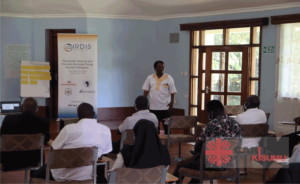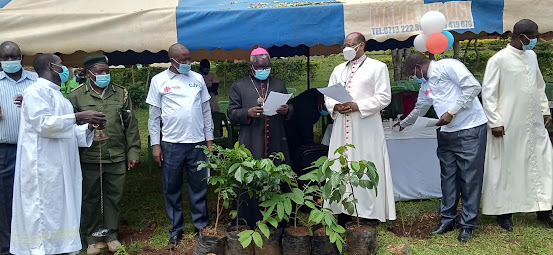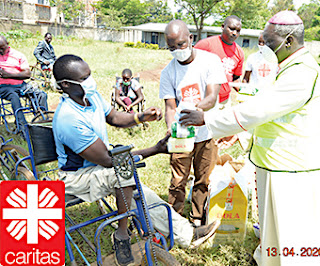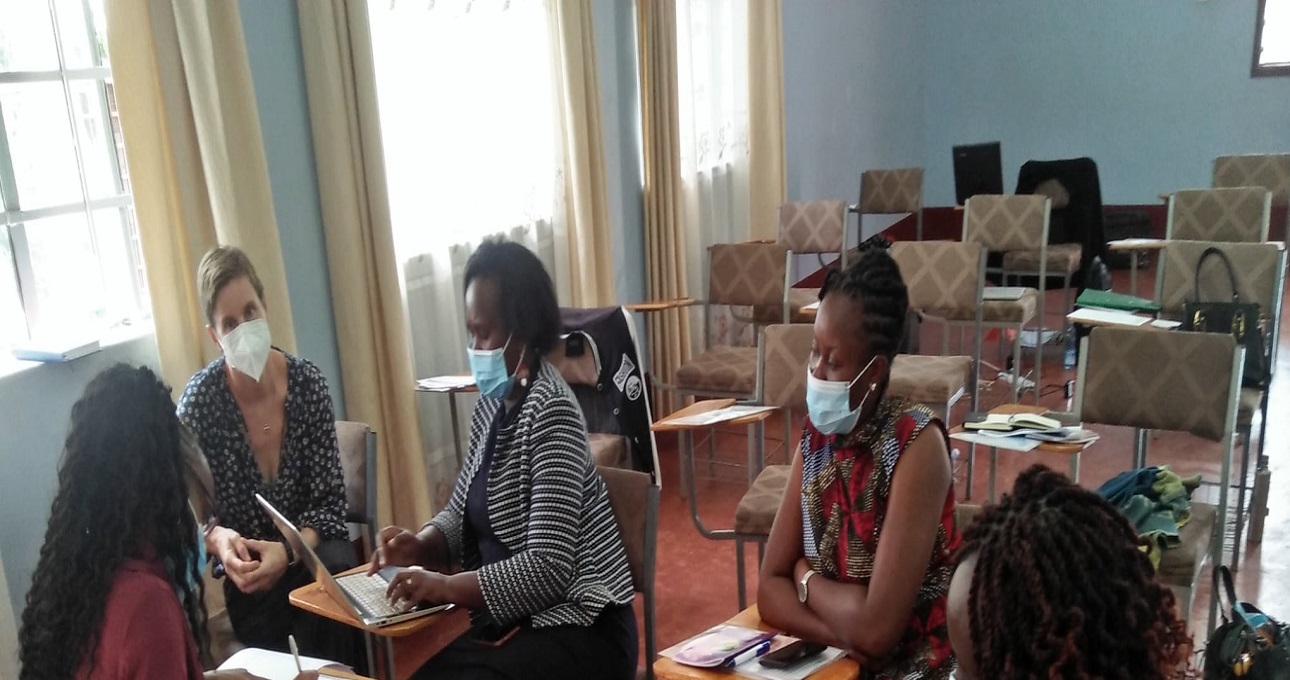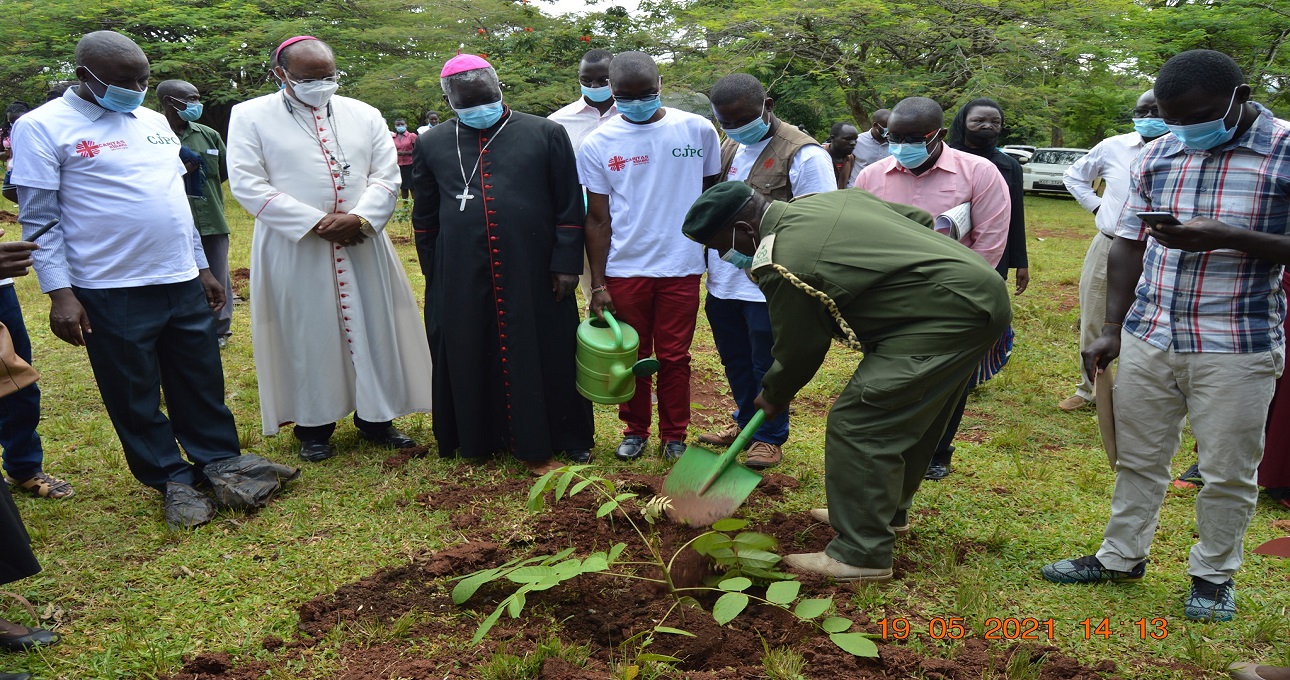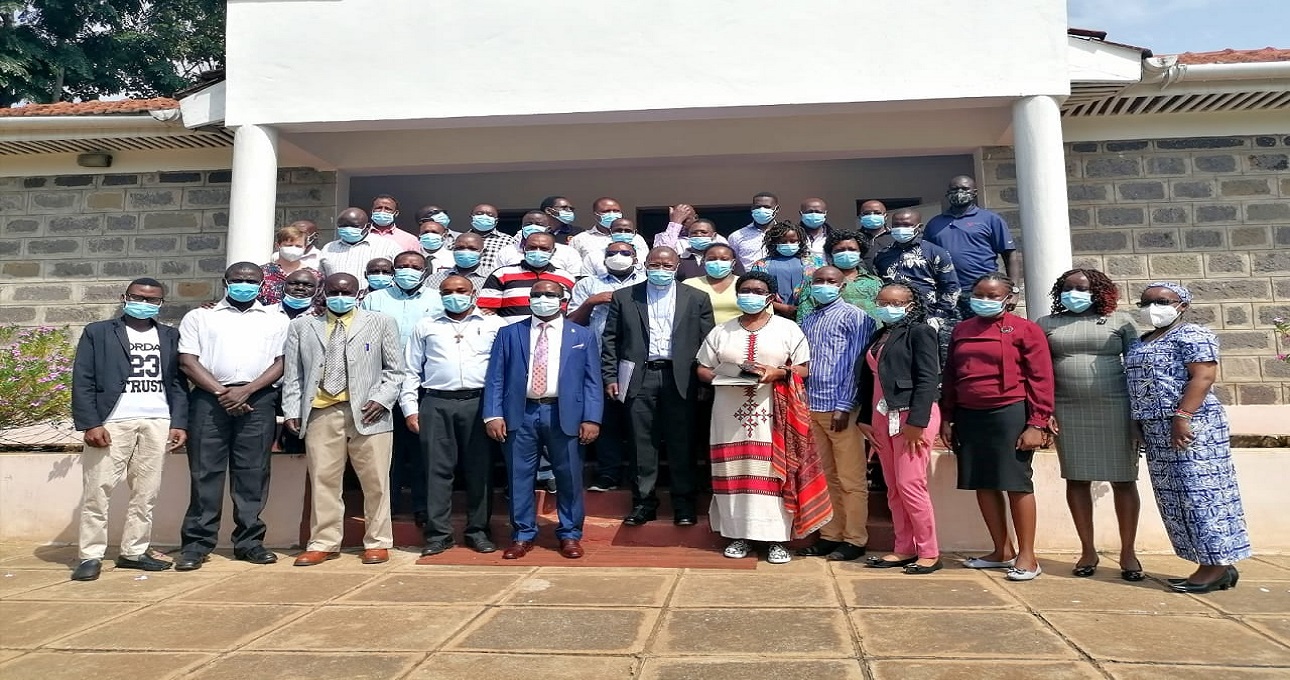Category: Company News
CIRDE-KISUMU, KENYA: Dialogue is a part of the evangelizing mission of the Church
The Kenya Conference of Catholic Bishops, through its Commission for Inter-Religious Dialogue and Ecumenism (CIRDE) organized a training for the Diocesan Coordinators and for the members of AOSK and RSCK from the Dioceses of the Metropolitan See of Kisumu. This training on inter-religious dialogue and ecumenism was held at St Patrick’s Pastoral Centre in Kabula, Bungoma Diocese as from 26th-29th October 2021. The key facilitator of this training was Tangaza Univesity College through its Institute for Religious Dialogue & Islamic Studies (IRDIS).

Fr Ken (left) & Fr Nyattaya (right) making a presentation |
The Archdiocese of Kisumu was represented by two Priests, Rev. Fr. Samuel Nyattaya the Kisumu-CIRDE Director who also doubles as the Director for Caritas/CJPD, and Rev. Fr. Kenney Opole.
|
Bishop Joseph Obanyi addressing the participants during CIRDE Training in Bungoma |
The Apostolic Administrator of Bungoma, Rt. Rev. Joseph Obanyi made his keynote remarks and officially opened the training on behalf of Rt Rev. Bishop Willybard Lagho, the Chairperson of KCCB-CIRDE. In his remarks, he welcomed the CIRDE members of Kisumu Metropolitan. He urged the members not to be afraid of carrying out the task entrusted to them by their bishops. The Metropolitan See of Kisumu comprises of 8 dioceses namely: Kisumu, Lodwar, Kitale, Bungoma, Kakamega, Eldoret, Kisii, and Homabay.
The first day of of the training was conducted by Rev. Fr. Innocent Maganya, a Missionary of Africa, who advises and coordinates inter-religious dialogue for Tangaza University College. He led us in reflecting on two key ideas: DIALOGUE and PROCLAMATION. It is true that we are living in a pluralistic world in which more and more Christians are coming into contact with followers of other religions. The question to ask is: what is the mission of the church in such a pluralistic world? What is the attitude of the church towards people of other religions? The need to answer these key questions led to the creation of a specific office
|
Rev. Fr. Innocent Maganya conducting the CIRDE training in Bungoma |
known as Pontifical Council for Inter-Religious Dialogue.
Further questions to ask in this reflection are: Knowing what dialogue with other religions entails, does it go together with proclamation of the Gospel, an exercise which invites people to accept the Gospel and be incorporated into the Church through Baptism? Can these two go together?
In order to enrich the reflection on dialogue and proclamation, there are some key Church Documents that contain a lot of important ideas. These are Ecclesiam Suam (1964), Lumen Gentium, Gaudium et Spes, Nostra Aetate, Dignitatis Humanae, Africa Terrarum, Dialogue and Mission, Redemptoris Missio, Dialogue and Proclamation, and Fratelli Tutti. The convergent point in these documents is that dialogue with other religions is part of the evangelizing mission of the church. Since Vatican II Council, the Church has acknowledged the presence of positive values not only in religious life of individuals but also in the religious traditions to which they belong.
In 1991, the Congregation for the Evangelization of Peoples jointly with the Pontifical Council for Inter-Religious Dialogue produced a Document known as Dialogue & Proclamation. This Document has three parts:
- About inter-religious dialogue
- About the necessity to proclaim Jesus to the world
- About how proclamation and inter-religious dialogue both for a double commitment of the church.
At that time, people were hesitant in regard to dialogue and they were uncertain about the necessity of proclamation. This document outlines two difficulties, one from within and another from without. On the one hand, we have Christians who lack respect and appreciation for other believers and their their traditions, or they have an attitude of superiority. On the other hand, we have members of other religions fearing that the church’s evangelizing mission may result in the destruction of their religion and culture.
There are different forms of dialogue:
- Dialogue of life, in which people strive to live in an open and neighbourly spirit sharing their joys and sorrows
- Dialogue of action in which Christians and others collaborate to take an action on a common issue affecting them
- Dialogue of theological exchange in which specialists seek to deepen their understanding of their respective religious heritage and to appreciate each other’s spiritual values.
- Dialogue for integral development in which Christians and other religions collaborate on some social developments issues of their society. This could include activities done by Caritas.
Over the years, the Archdiocese of Kisumu has constantly been engaging the Religious Leaders in responding to some of the issues affecting the community. Kisumu being a region that suffers a lot of violence particularly those related to politics, cooperation between different churches and faiths has been one of our strengths. This training has been also been a blessing to the department of Caritas/CJPD in the Archdiocese of Kisumu as it will strengthen the engagement we have been having with the leaders of the other Christian Denominations and other Religions like the Muslims and the Hindu Community in the Archdiocese of Kisumu.
CJPD/Caritas Kisumu: Use the Community Score Card to scrutinize your Leaders before you elect them!
At the beginning of the year 2018, the Kenya Conference of Catholic Bishops (KCCB) received funding from CAFOD (Catholic Fund for Overseas Development) to implement a joint Project made by the Department of Justice & Peace and Caritas Kenya. This Project was known as Strengthening Local Governance and Community Empowerment Project. The overall goal of this Project was to enhance democratic and participatory governance and holistic community empowerment in the target regions. Kisumu County (under the Archdiocese of Kisumu) was one of the target areas together with Kwale, Kericho, and Nyandarua Counties.
This Project was intended to run from 2018-2020 but due to the unforeseen challenges of COvid-19 Pandemic, it has gone to 2021. Some of the key intervention issues includes enhancing public participation through established structures like Citizen Oversight Forums. It was also focusing on carrying out an oversight of the County projects through budget tracking, community score cards and social audit. It also aimed at engaging the County Oversight Forums with the county and national government structure like the County Budget and Economic Forum (CBEF). To do this, the Project aimed at building the KCCB structures at the National and Diocesan levels targeting the Bishops’ Committees, as well as the Diocesan Coordinators and Commissioners of both CJPC and Caritas. Civic education was also a component of this Project so as to do policy advocacy like enacting public participation laws.
Speaking during the opening of one of the trainings of the Diocesan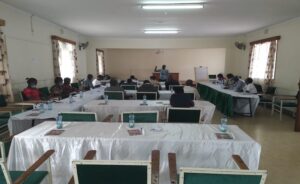 Commissioners of Justice and Peace, the Diocesan Coordinator, Rev. Fr. Samuel Nyattaya emphasized to the participants that the training on how to develop a Community Score Card is so important especially now that the country is gearing to the General Elections of 2022.
Commissioners of Justice and Peace, the Diocesan Coordinator, Rev. Fr. Samuel Nyattaya emphasized to the participants that the training on how to develop a Community Score Card is so important especially now that the country is gearing to the General Elections of 2022.
The Community Score Card (CSC) is a participatory, community based monitoring and evaluation tool that enables citizens to assess the quality of public services such as a health centre, school, public transport, water, waste disposal systems and so on. It is used to inform community members about available services and their entitlements and to solicit their opinions about the accessibility and quality of these services. By providing an opportunity for direct dialogue between service providers and the community, the CSC process empowers the public to voice their opinion and demand improved service delivery.
This training was being done by the Project Officers from KCCB, Mr Festus (CJPD) and Mr Donald (Caritas Kenya). It was attended by 35 participants drawn from across the County of Kisumu.
Such engagements are part of the many other ways through which the Archdiocese of Kisumu demonstrates its social concern. The Church has both a right and a responsibility to show her concern on issues that affect the society.
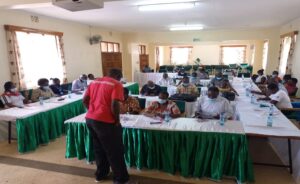
By the Administration
KENYA: Care for Creation “Begins from Change of Heart,” Prelate at Tree Planting Initiative
A Prelate from Kenya’s Archdiocese of Kisumu during tree planting initiative to mark the end of the special Laudato Si’ anniversary year has stressed that caring for creation requires individual’s change of heart.
“It is not just planting trees, but change of heart,” Archbishop Philip Arnold Anyolo told AMECEA online in an interview Friday, May 21, adding that, “One should act consciously knowing that caring for creation is charity work.”
KENYA: Caritas in Kisumu Archdiocese Aid People with Disability Amidst COVID-19
Kisumu Archdiocese through Caritas office has reached out to assist People with Disabilities (PWDs) whom they felt had been overlooked in-terms of sensitization and provision of basic needs in the wake of COVID-19 pandemic.
Caritas “shares the mission of the Catholic Church to serve the poor and promote charity and justice throughout the world,” ensuring that the voices of the poor are heard and acted upon,” Fr. Samuel Nyattaya the Director Caritas Office, Kisumu told AMECEA Online in an interview Monday, April 20.
“We (Caritas Kisumu) teamed up with other Civil Society Organizations (CSOs) and formed a WhatsApp Group named Kisumu City Response. Different organizations in this group made their own interventions towards sensitizing the people of Kisumu on Covid-19,” he continued.
Fr Nyattaya further disclosed, “We noticed a gap in that there was a special category of people who had not received attention. These were the People with Disabilities (PWDs).”
“Immediately, we sprang into action to give them whatever support we could. The love of Christ, caritas Christi, urges us to make this response towards this category of the people of God,” Fr. Nyattaya explained.
The PWDs who have been carrying out small businesses within Kisumu town before COVID-19 outbreak, are currently in their homes with no jobs after government issued directives to be followed to help stem the spread of Coronavirus.
According to the cleric, the PWDs were “relocated from the usual market places where they used to sell their wares. In some cases, they were not considered in the allotment of spaces, owing to the vulnerability of some of them due to low immunity. They have been forced to stay at home (and) this heavily impacted on their daily living.”
“Every year, the Archdiocese of Kisumu, like all the dioceses in Kenya, carry out a campaign during the season of Lent. During these campaigns, people make contributions from their fasting. As we budget with this money, a huge chunk of it is allocated for social justice projects like helping people during humanitarian crisis,” he said.
Caritas Kisumu who managed to reach 65 PWDs irrespective of their faith, offered foodstuff which would be enough for about two days.
“This, we hope, can ease the burden of feeding their families, especially now that their businesses have been affected. We also gave them a bar of soap each, now that washing of hands is one of the ways of keeping the virus away,” the director added.
Asked about the future plan Caritas Kisumu has with PWDs, Fr Nyattaya who is also Director of Catholic Justice and Peace Commission (CJPC) disclosed that they intend to sensitize the PWDs on how to prevent themselves from Coronavirus and also reach out to those affected by floods.
“One huge gap we noticed in our interaction with the PWDs is the lack of proper information about Covid-19. There has not been a concerted education that has been tailor-made with the PWDs in mind. We engaged with Red Cross and did a small training for about 15 of them but we plan to link with our Health Department to organize a training for the PWDs on how to keep safe from the virus,” Fr. Nyattaya said.
Speaking as a beneficiary, Mr. Nick Mak’Ondwat said in a video clip posted in Caritas Archdiocese Kisumu Facebook page, “Most of us are back in the houses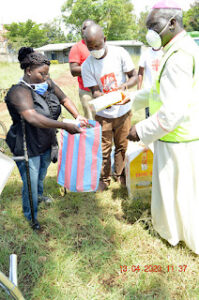 and that means we are doing nothing. Therefore, getting income is a challenge.”
and that means we are doing nothing. Therefore, getting income is a challenge.”
“Persons with disability have been really affected because all those who were doing businesses cannot continue with their work (and) I think this is one of the first activities we are seeing for distributing food for People with Disability, and we kindly request you to continue and even help us look for more support,” he added.
FOOD SAFETY CONCERNS
Kenyans have become cautious of the food they consume. Remember, there are also FOOD-BORN DISEASES (FBD). Sometimes a mango might be a carrier of one or more cancerous chemicals
GROW UR OWN FOOD AND PRACTICE GOOD AGRICULTURAL PRACTICES.
EVALUATION OF LENTEN CAMPAIGNS OF 2021
5th Anniversary of Laudato Si
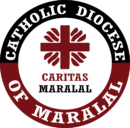
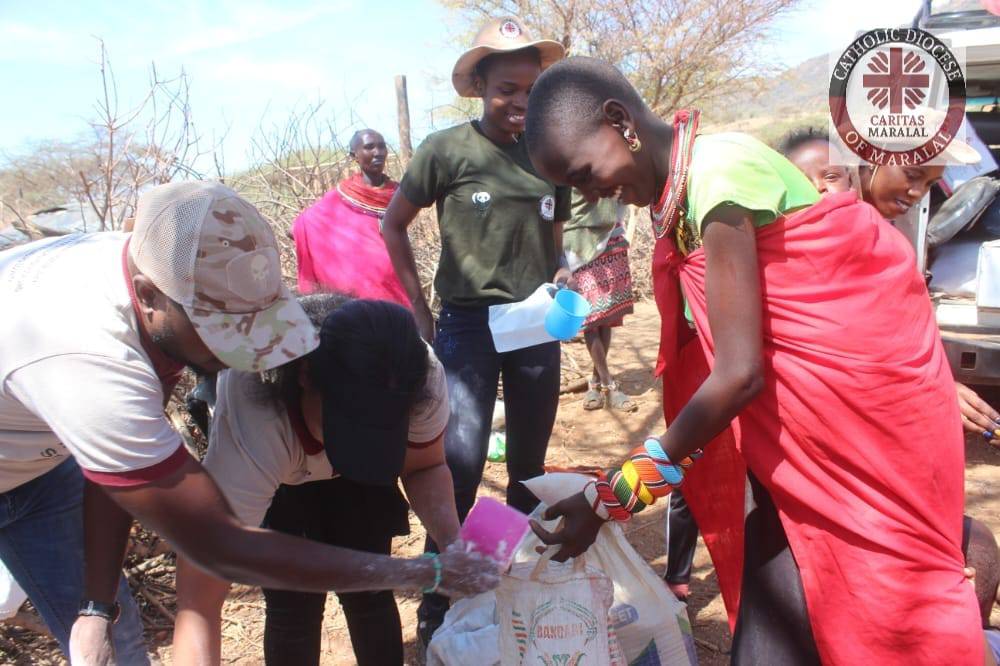

 2
2